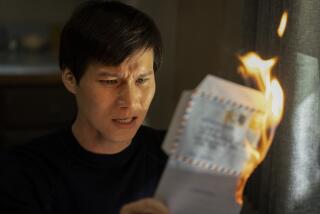A Sympathetic Character : Do Our Loyalties Flow From Something in Our Hearts That Our Minds Don’t Understand?
- Share via
SOMETIMES WHEN I AM watching a tennis match or football game or movie, I am surprised by the direction my sympathies take.
I may be watching the Rams against the Houston Oilers. I have turned the game on expecting to be for the Rams, their being the local team.
But halfway through the game, for reasons I cannot explain, I find myself rooting for the Oilers. This switch of sentiment has nothing to do with any intellectual decision.
I am simply overcome by sympathy for the Oilers. I want them to win. And yet this feeling goes against a long-established loyalty, one reinforced by the fact that the Rams are the home team, sort of, if you call Anaheim home.
It makes me wonder if our loyalties flow from something in our hearts that our minds don’t understand.
I happen to be a big fan of the world’s No. 1 tennis player, Ivan Lendl. When Lendl first appeared on the scene, playing in the U.S. Open, he left me cold. I was against him. He was not, at first glance, a very attractive man. His face is gaunt, with high cheekbones and sunken cheeks. But he grew on me. His serve and his forehand were ferocious. His lean body was quick and graceful. Perhaps I began to favor him because the crowd was always against him. He heard them cheering for the other man, and sometimes he looked up at them as if to say, “Why don’t you like me?”
Then when my wife and I were traveling in Germany, we happened to meet him in a Frankfurt hotel. He had played a match there that day. He walked into the cocktail lounge where we were having a drink. I said hello and shook his hand. He seemed pleased to be recognized. He was shy. He grinned like a schoolboy.
I’ve been for him ever since.
I disliked Jimmy Connors when he was No. 1. He was arrogant, brash and rude. But Connors matured. Perhaps it was only that when John McEnroe came along, Connors saw himself and decided to change. He is now, at 35, as fierce a competitor as ever, still up there in the ratings, still going all out on every shot. But humor has replaced his rancor. He laughs. He clowns. He’s lovable.
When Connors played Lendl in the semifinals of the U.S. Open I wondered which way my sentiment would go. I knew it would not be a decision I would make. As soon as the match started, I knew I didn’t want Connors to be humiliated, but I wanted Lendl to win. I wanted him to stay on top.
When Lendl played Mats Wilander in the finals, my loyalty stayed with him. But the television cameras made it difficult. They would focus first on Wilander’s lovely wife, tense and anxious in the stands, and then on Lendl’s lovely girlfriend, no less tense and anxious. Intellect will not serve you in conflicts of that kind.
When the Raiders were in Oakland, I despised them. Then they hired Jim Plunkett, who had been sitting on the bench for the 49ers, evidently washed up. But Plunkett is an extraordinary man, besides being good to his blind parents. He led the Raiders to two Super Bowl victories. I have been a Raider fan ever since, mostly on the hope that they will have to give Plunkett one more chance.
As I say, these incomprehensible loyalties are even inspired by movies. In a movie it should be clear who is good and who is bad. But I often find that my heart is going against the script. I do not often side with the bad guy, being a moralist myself; but I often find myself pulling for the other girl.
Ruth Hussey almost never got the man. But I was always in her corner. She was warm, intelligent, desirable and noble. That was her problem: too darn noble. She would give the hero a peck on the cheek and withdraw in favor of his wife or fiancee, who was more often than not a selfish shrew.
I often found myself sympathizing with Gail Patrick, who was always portrayed as cold, ambitious and deceitful--for example, as Carole Lombard’s bitchy sister in “My Man Godfrey.” Why William Powell didn’t prefer her to that ding-a-ling Lombard I couldn’t understand.
(I met Miss Patrick once at a party and told her that I had always thought of her as a “class broad.” She didn’t seem to mind.)
For some reason, I was also always perversely sympathetic to Mayo Methot, who was invariably cast as a gangster’s moll. She wore cloches, tight skirts and too much lipstick on bee-stung lips. Her men treated her like a dog. She usually had a black eye. I always hoped she would assert herself, but, alas, she was before her time.
The big question now is how I feel about the Dodgers.
I trust that my heart will tell me.
More to Read
Go beyond the scoreboard
Get the latest on L.A.'s teams in the daily Sports Report newsletter.
You may occasionally receive promotional content from the Los Angeles Times.






